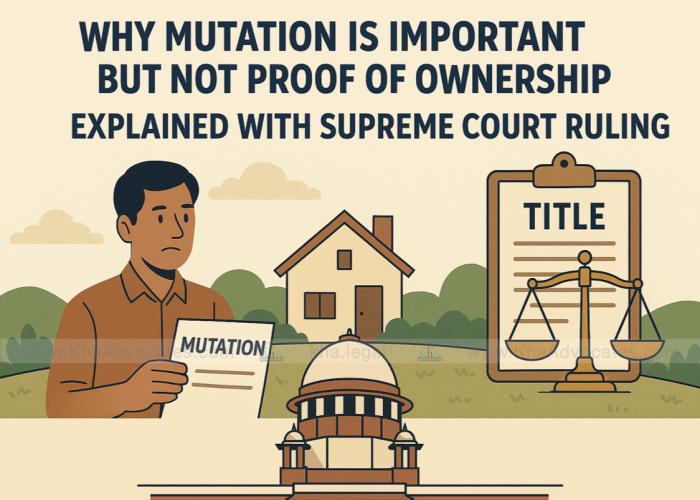
Published on: May 25, 2025
Many landowners and property buyers in India mistakenly believe that mutation of property is equal to legal ownership. However, as clarified by the Supreme Court of India and several High Courts, mutation is merely a fiscal or administrative process and does not confer any title. This blog decodes the importance of mutation, its legal status, and critically examines landmark Supreme Court judgments that definitively settled the issue.
Mutation refers to the process of updating land or property records in the revenue department once ownership is transferred through sale, inheritance, gift, or will. It enables the government to assess and collect property tax from the rightful person.
In simple terms, mutation reflects who is in possession for tax purposes, but it is not conclusive proof of ownership.
While mutation is not ownership, it is still crucial for several reasons:
It helps the government maintain updated land records.
It ensures that the property tax is paid by the current possessor.
It serves as a presumptive evidence of possession, aiding in administrative matters.
It is often required when applying for electricity, water, or municipal services.
It can be used in courts to support a claim, though not as standalone proof.
In this case, the Supreme Court held:
“Mutation in the revenue record does not create or extinguish title nor has it any presumptive value on title. It only enables the person in whose favour mutation is ordered to pay the land revenue.”
This judgment laid the foundation for the doctrine that revenue records are fiscal and not legal proof of ownership.
Here, the Supreme Court clarified:
“Entry in revenue records is not a document of title. It merely reflects possession. Title must be established independently through documents such as sale deed, gift deed, or court decree.”
This means a person can be shown as a possessor in mutation records but still not be the rightful owner.
A more recent case where the Court reiterated:
“The mutation of land in revenue records does not confer ownership title to the person. It only confirms possession for revenue purposes.”
This case also emphasized that if a person’s title is challenged, they must prove it through registered documents and chain of title – not mere mutation.
Aspect | Mutation | Legal Ownership (Title) | ||||||||||||||||||||||||||||
|---|---|---|---|---|---|---|---|---|---|---|---|---|---|---|---|---|---|---|---|---|---|---|---|---|---|---|---|---|---|---|
Nature | Administrative / fiscal | Legal / proprietary | ||||||||||||||||||||||||||||
Purpose | Tax assessment, record updation | Confers full rights and interest in property | ||||||||||||||||||||||||||||
Document Required | Application to revenue authorities | Registered sale deed / gift / will / court decree | ||||||||||||||||||||||||||||
Proof of Ownership? | ❌ No | ✅ Yes | ||||||||||||||||||||||||||||
Can be challenged? | ✅ Easily | ❌ Not easily if legally registered | ||||||||||||||||||||||||||||
Use in litigation? | Limited support | Primary evidence |
Held that:
“Mutation entries in revenue records are neither conclusive nor final. Ownership has to be proved through valid title documents.”
The Court ruled that:
“A mutated name in municipal records cannot be relied on to establish legal title. Mutation cannot replace a registered title deed.”
“If my name is in mutation, I am the owner.”
❌ Wrong. You are merely the recognized possessor for tax purposes.
“Mutation replaces the need for registration.”
❌ False. Only a registered deed establishes title.
“Mutation protects me from legal disputes.”
❌ Not entirely. Without a valid title, your claim can be challenged.
Although mutation is not ownership, it can support a claim of possession when:
There is no contesting title, and
It is combined with other evidence like tax receipts, utility bills, or long possession.
Still, courts always look for legal instruments to decide ownership.
In conclusion, mutation is important for taxation and record maintenance, but it does not grant or prove ownership. Indian courts – including the Supreme Court – have consistently held that title must be proven through registered legal documents, not revenue entries.
If you’re purchasing or inheriting property, always ensure you have:
A registered title deed
A clear chain of title
Encumbrance certificate & title search
And legal assistance for documentation
At KHA Advocates, we specialize in property law, title verification, mutation correction, and real estate litigation. Our experienced team can ensure your property rights are secure and legally valid.
📩 Contact Us Today or visit www.KhaAdvocates.com for a consultation.

